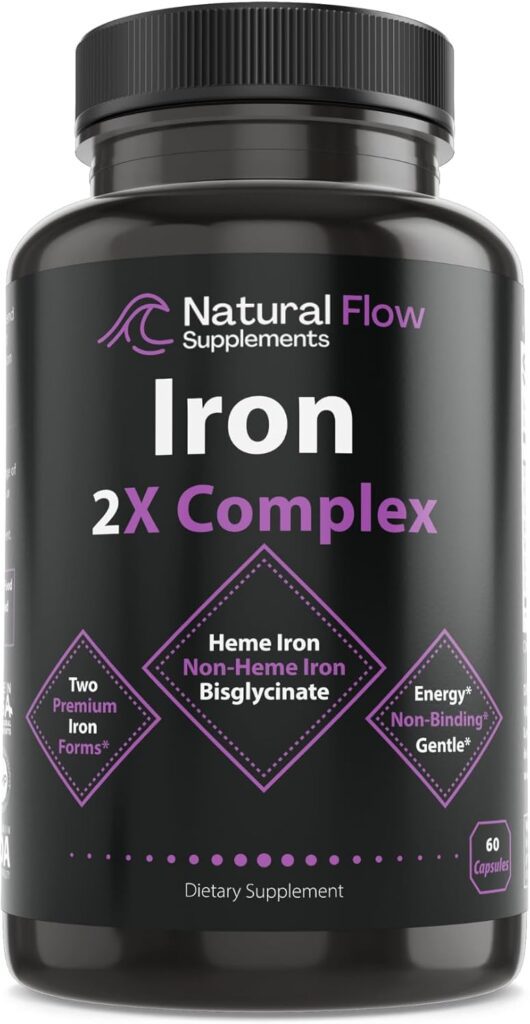Feeling constantly tired, weak, or short of breath can take a serious toll on your daily life.
For many people, these symptoms are linked to anemia—a condition that affects your blood and energy levels.
By understanding what causes anemia and supporting your body with the right nutrients and lifestyle strategies, you can help restore energy, improve overall health, and feel like yourself again.
In this post, we will explore 5 ways to support anemia, starting with what causes it.
Let’s dive in!
What Is Anemia?
Anemia occurs when your body doesn’t have enough healthy red blood cells to carry oxygen to your tissues.
This can leave you feeling fatigued, lightheaded, or weak.
Common causes include iron deficiency, vitamin B12 or folate deficiencies, chronic illness, and blood loss.
Supporting your body with nutrient-rich foods, supplements, and healthy habits can help your body produce red blood cells more effectively and combat the symptoms of anemia.
5 Ways to Support Anemia
1. Iron Supplement Complex
Iron is essential for producing hemoglobin, the protein in red blood cells that transports oxygen throughout your body.
Taking a high-quality iron supplement complex ensures your body gets absorbable forms of iron, often paired with vitamin C or other cofactors to improve absorption.
Choosing chelated iron makes it easier for your body to absorb and use it effectively.
Out of all of the iron supplements I’ve tried, Natural Flow’s Iron 2x Complex is my personal favorite.
Natural Flow’s Iron 2X is my personal favorite for anemia because it combines both heme and chelated non-heme iron for maximum absorption and blood-building support.
It also includes vitamin B6 and folate, which are essential cofactors for healthy red blood cell production, making it a complete formula for anemia support.
Unlike many iron supplements, it’s gentle on the stomach and easy to digest, so you can take it daily without discomfort.
Simply take 1 capsule per day and you’re good to go!
2. Eat Iron-Rich Foods
Dietary iron is key to maintaining healthy red blood cell levels.
Heme iron from red meat, poultry, and fish is absorbed more efficiently, while non-heme iron from lentils, beans, tofu, and spinach also supports iron levels.
Pairing plant-based iron sources with vitamin C-rich foods like citrus, strawberries, or bell peppers enhances absorption, helping your body get the most from what you eat.
3. Support B12 and Folate Intake
Vitamin B12 and folate play a critical role in red blood cell production.
A deficiency in either can lead to megaloblastic anemia, where red blood cells are abnormally large and inefficient at carrying oxygen.
Include foods like eggs, dairy, leafy greens, legumes, and fortified plant milks in your diet to support healthy blood cell production.
For those with dietary restrictions, B12 or folate supplements may be necessary to meet daily needs.
4. Manage Inflammation & Chronic Illnesses
Chronic inflammation from conditions such as autoimmune disorders or infections can interfere with your body’s ability to produce and utilize red blood cells.
Eating anti-inflammatory foods like fatty fish, turmeric, and berries can help reduce inflammation and support overall red blood cell health.
Working with a healthcare provider to manage underlying conditions is essential for long-term anemia prevention.
5. Prioritize Rest & Stress Management
Stress and insufficient sleep can worsen the fatigue caused by anemia.
Practicing stress-reducing techniques like meditation, deep breathing, gentle exercise, and ensuring 7–9 hours of quality sleep each night can support your body’s recovery.
Reducing stress allows your body to focus on essential functions like producing healthy red blood cells and maintaining energy levels throughout the day.
Support Anemia
Supporting anemia is about more than just increasing iron: it’s about giving your body the nutrients, rest, and lifestyle habits it needs to create healthy red blood cells, restore energy, and improve overall wellness.
Combining iron supplementation, nutrient-rich foods, stress management, and attention to underlying health issues can help you naturally combat anemia and feel your best.
With these tips, I hope they help your anemia journey.
Thanks for reading!
Affiliate Disclosure
Some of the links on this site are affiliate links. This means that if you click on the link and purchase the item, we may receive an affiliate commission at no extra cost to you. I only recommend products or services that I believe will add value to my readers, however, some (not all) do pay us to be on this blog. Your support and theirs help keep this blog running, and I genuinely appreciate it.
Medical Disclaimer
The information provided on this website is for educational purposes only and is not intended as medical advice. This blog or the writer is not a licensed healthcare professional, and the content should not be used as a substitute for professional medical diagnosis, treatment, or advice. Always consult with your physician or other qualified healthcare provider before starting any new treatment or making any changes to your healthcare routine.
